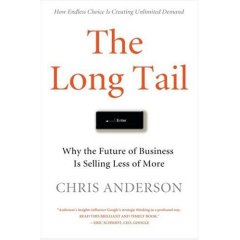The Long Tail
 In his book, The Long Tail, Why the Future of Business Is Selling Less of More, Chris Anderson explains and redefines the 80/20 rule of economics.
In his book, The Long Tail, Why the Future of Business Is Selling Less of More, Chris Anderson explains and redefines the 80/20 rule of economics.I purchased the book the moment it came out in 2006 and below is just my overly simplistic attempt to capture the book’s point.
80/20 Rule - Bricks and Mortar Retail
In retail, roughly 20% of products, top hits, represent 80% of total sales. The rest of the products may sell once in a while.
Online Stores – Driving Business from Hits to Niches
Anderson points out that in online business the numbers reverse. The long tail of niche products is so large that even if products sell sometimes the niche sales could be just as large if not larger than top hits in the short head.
Wal-Mart vs. iTunes & Rhapsody
Wal-Mart, largest U.S. music retailer, maxes out at 4,500 unique CD titles (about 60,000 tracks) of which top 200 albums represent 90%+ of sales. In contrast, iTunes & Rhapsody offer millions of tracks since cost of carrying digital inventory is inexpensive. Hits will always be hits, but the long tail of music tracks that sell once in a while is a major chunk of change for large aggregators.
The New Economics of Culture and Commerce
This description on the book cover is spot on. Innovation influences behavior and change in our culture and commerce.
Final Thoughts
The book is excellent and makes you think. What’s most apparent is that it centers on high value brands: Google, eBay, iTunes, Amazon, Netflix and so on. They are top aggregators in their respective fields, they do remarkable work and consumers trust and embrace them. Ultimately, quality brands win.
Ghena
Join PrivateLessons.com I Syndicate Feed I Contact Me

